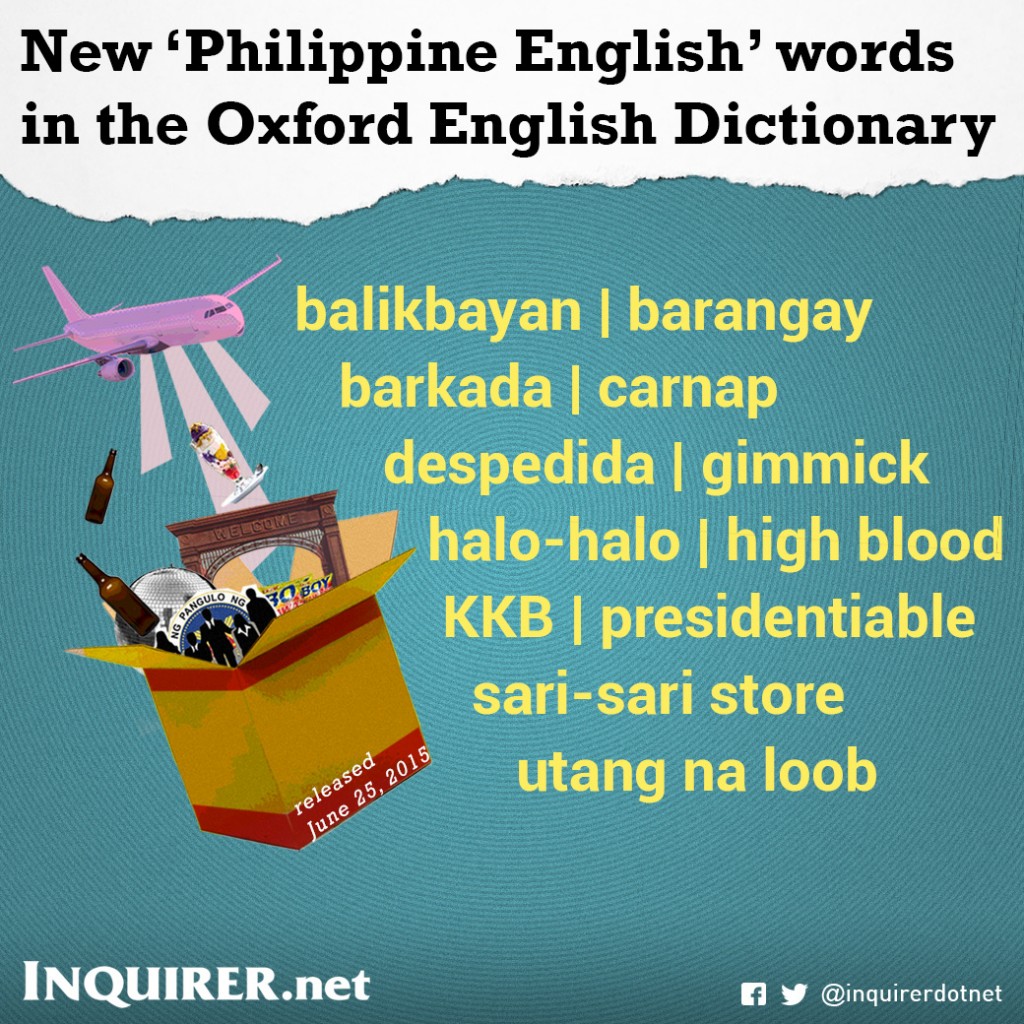LIST: 40 Filipino-coined words added in Oxford dictionary
The Oxford English Dictionary (OED) has just included 40 Philippine English terms and expressions in its June 2015 update, the largest single batch of terms from Tagalog and Filipino usage of English to be published on the lexicon.
Danica Salazar, a Filipino lexicographer who works as Consultant Editor on the dictionary, cited the Philippine-sourced additions as a “legitimization of Philippine English as a variety in its own right.”
The selections, chosen through the observed use of the words online and in publications, and through linguistic studies, include words borrowed from Tagalog, hybrid expressions, derived terms, compound words, Filipinized translations, and complete changes or conversions of word meanings. KS
Below is a full list of the 40 words with their meanings as seen on the OED:
advanced – of a clock or watch: indicating a time ahead of the correct time
bahala na– expressing an attitude of optimistic acceptance or fatalistic resignation, esp. in acknowledging that the outcome of an uncertain or difficult situation is beyond one’s control or is preordained; ‘que sera sera’. Hence also as noun (n): an approach to life characterized by this attitude.
balikbayan– a Filipino visiting or returning to the Philippines after a period of living in another country.
balikbayan box– a carton shipped or brought to the Philippines from another country by a Filipino who has been living overseas, typically containing items such as food, clothing, toys, and household products.
baon– money, food, or other provisions taken to school, work, or on a journey.
barangay– in the Philippines: a village, suburb, or other demarcated neighborhood; a small territorial and administrative district forming the most local level of government.
barkada– a group of friends.
barong– short for barong tagalog n.
barong tagalog– a lightweight, embroidered shirt for men, worn untucked and traditionally made of piña or a similar vegetable fiber.
baro’t saya– a traditional Philippine costume for women, consisting of a collarless blouse and a long wrap-around skirt.
batchmate– a member of the same graduation class as another; a classmate. Also in extended use.
buko– the gelatinous flesh of an unripe (green-husked) coconut.
buko juice– a drink made from the clear watery liquid inside unripe coconuts; coconut water.
buko water– buko juice
carnap– to steal (a motor vehicle).
carnapper– a person who steals a motor vehicle; a car thief.
comfort room– a room in a public building or workplace furnished with amenities such as facilities for resting, personal hygiene, and storage of personal items (now rare); (later) a public toilet (now chiefly Philippine English)
despedida– more fully despedida party; a social event honoring someone who is about to depart on a journey or leave an organization; a going-away party.
dirty kitchen– a kitchen where every day cooking is done by household staff, as distinct from a kitchen that is purely for show or for special use by the owner of the house.
estafa– criminal deception, fraud; dishonest dealing.
gimmick– a night out with friends.
go down (to get off a vehicle)- to get off a vehicle
halo-halo– A dessert made of mixed fruits, sweet beans, milk, and shaved ice, typically topped with purple yam, crème caramel, and ice cream.
high blood (adjectival use)- angry, agitated.
kikay– a flirtatious girl or woman. Also: a girl or woman interested in beauty products and fashion.
kikay kit– a soft case in which a woman’s toiletries and cosmetics are stored.
KKB– ‘kaniya-kaniyang bayad,’ literally ‘each one pays their own’, used especially to indicate that the cost of a meal is to be shared. Also as adjective.
kuya– an elder brother. Also used as a respectful title or form of address for an older man.
mabuhay– an exclamation of salutation or greeting: long live! good luck (to you)! hurrah! cheers!
mani-pedi– a beauty treatment comprising both a manicure and a pedicure.
pan de sal– a yeast-raised bread roll made of flour, eggs, sugar and salt, widely consumed in the Philippines, especially for breakfast.
pasalubong– a gift or souvenir given to a friend or relative by a person who has returned from a trip or arrived for a visit.
presidentiable– a person who is a likely or confirmed candidate for president.
pulutan– food or snacks provided as an accompaniment to alcoholic drinks.
salvage– to apprehend and execute (a suspected criminal) without trial.
sari-sari store– a small neighborhood store selling a variety of goods.
sinigang– in Filipino cookery: a type of soup made with meat, shrimp, or fish and flavored with a sour ingredient such as tamarind or guava.
suki– a buyer or seller involved in an arrangement whereby a customer regularly purchases products or services from the same provider in exchange for favorable treatment. Also: the arrangement itself.
utang na loob– a sense of obligation to return a favor owed to someone.
